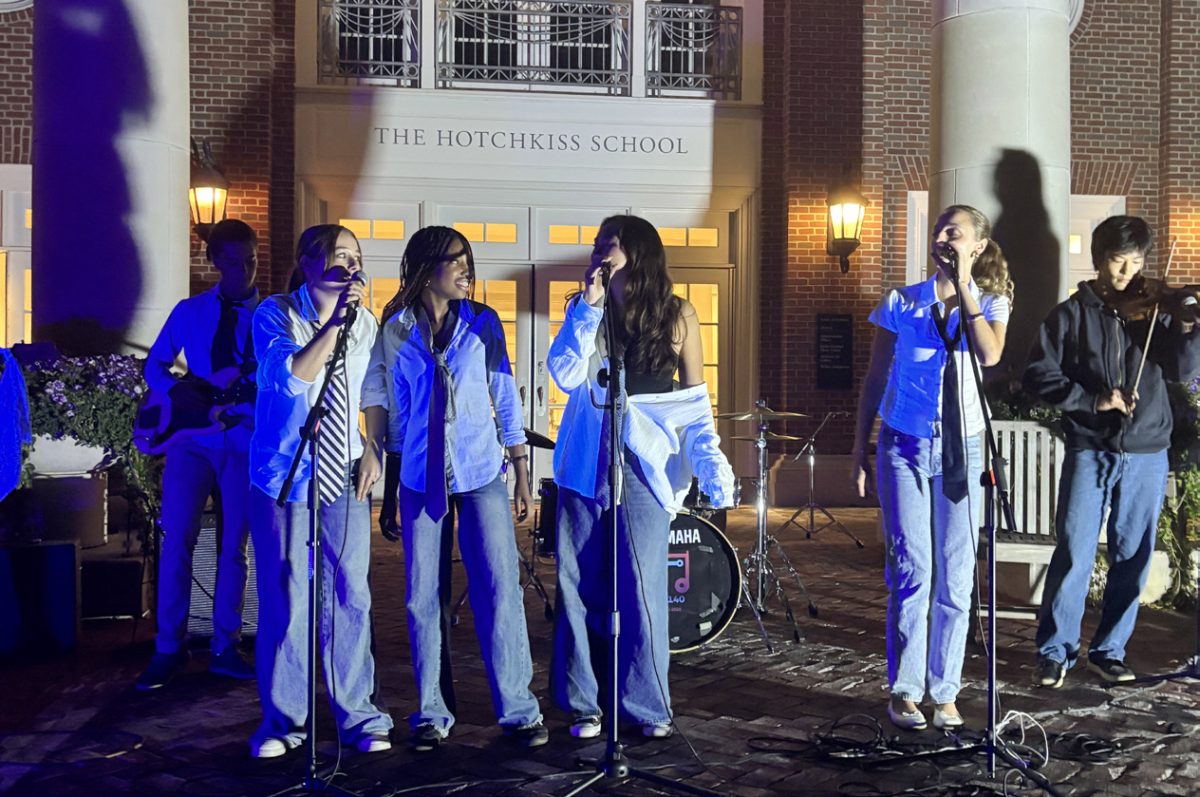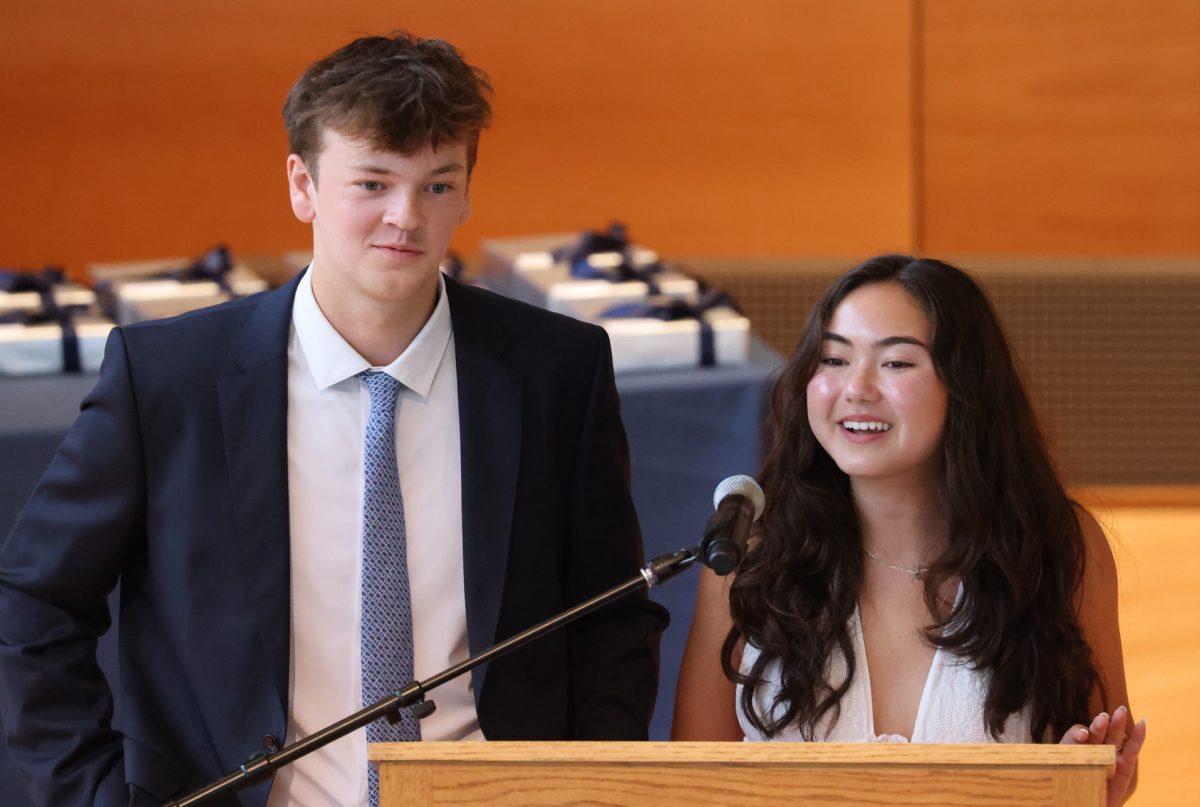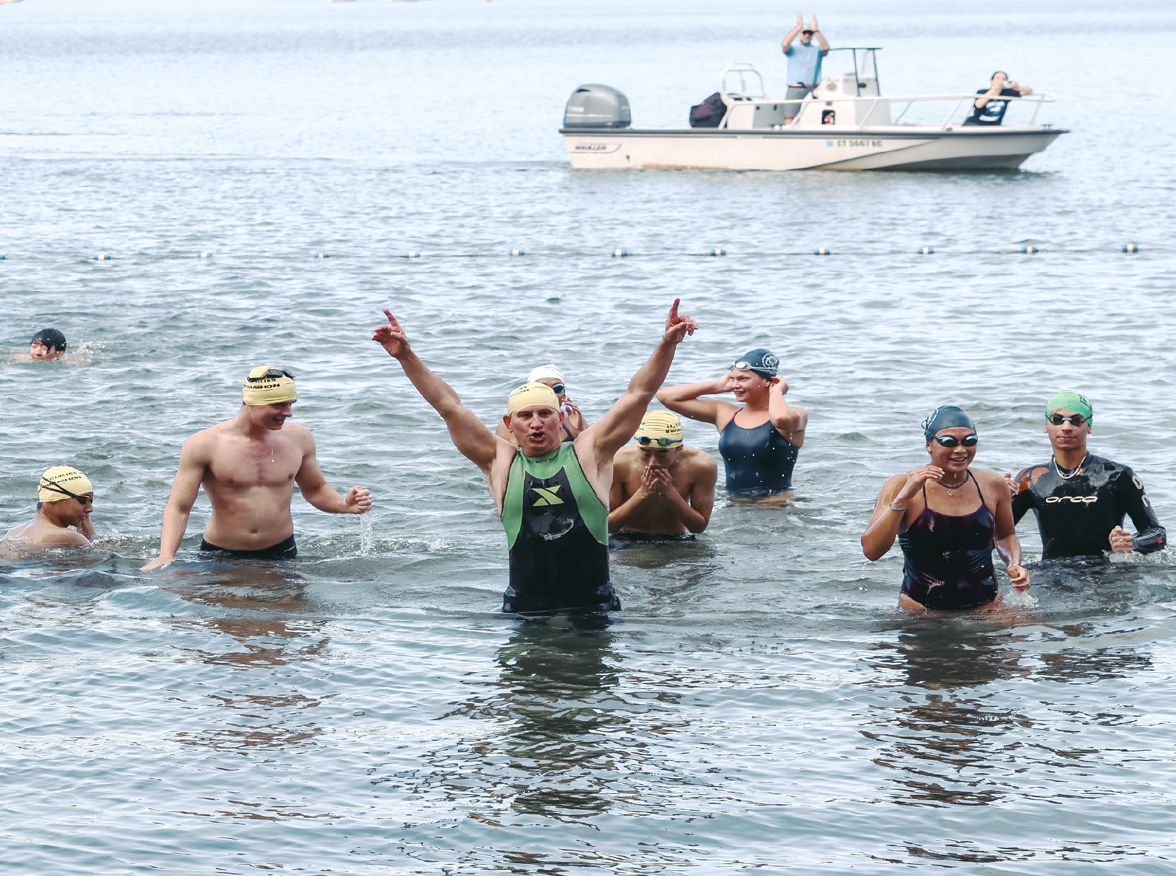The following is a transcript of some of the remarks given by Ms. Carita Gardiner, dean of the class of 2025, at the Senior Awards Ceremony on Thursday, May 29.
Before I address the class for the last time as a group, I’d like to talk with the people in the room who have supported these young adults through what has been a winding journey.
Our school motto advises us, “Guided by each other, let us seek better paths.” You—parents, bonus- parents, guardians, grandparents, siblings, other family, friends, and colleagues—have allowed them to find this path and learn to navigate it. You’ve walked, driven, or flown them here and there. You’ve completed their absence requests and written back to me when I ask for more information… and then even more information.
You’ve sent them packages, brought them treats, and made them snacks. You’ve cheered them on at their contests and shows in person and via livestreams, and consoled them when things didn’t work out. You’ve taken their late-night and early-morning calls to talk them down from Stress Level Ten or congratulate them on work well done. You’ve helped them in so many ways, and no matter what they say when they’re in “their feels,” they know it. They appreciate you.
They’ll probably thank you themselves, but I also want to thank you. You’ve raised remarkable humans I’ve felt lucky getting to know. And now I want to talk to you directly, class of 2025. I’d like the twenty-five (coincidence, I think not!) of you who had me as an English teacher Prep year to raise your hands. The people with their hands up might remember that one of our check-in questions was, “What topic could you give a half-hour speech about without having to do any preparation?” My topics include things I’ve learned from knitting, grammar, Peloton workouts, and romance novels.
Knitting: Mistakes happen. It’s not the end of the world when yarn falls off my needle or when I knit what should have been a purl. I’ve learned never to get upset when I drop a stitch. Instead, I locate the limit of the snag, grab a crochet hook, and start looping back up to where I am. In life, we make mistakes, and then we use our senses to figure out the extent of the damage and employ whatever tools we need to mend the gaps we’ve created. We can work to make beautiful things, even with they are imperfect.
Grammar: There are lessons from grammar that I think apply here and now and to your life ahead. Knowing the rules for how things work makes it easier to express ourselves. Additionally, the twenty-five kids who lived through all four Grammar Gateways with me will probably concur that putting in the time and effort early in the year to understand parts of speech was really helpful later, when we did the harder work with phrases and clauses. I love watching students push themselves to learn the rules of grammar and to feel great about their abilities to do hard things. I hope you will all be able to see that the hard work you put in here will provide you with advantages down the road.
Peloton Workouts: I cherish the ways the Peloton instructors get me to lift heavier and move my legs faster and hold my poses longer. They remind me that when my muscles are quivering and my brain is saying to collapse into a heap, I can keep pushing and will be grateful that I did. With their help, I can power through discomfort and fatigue. I love the words they use to keep me going, because all of the lines apply to so much more than working out. I’ll limit myself to my top ten:
You are a work in progress and a masterpiece at the same damn time. Instead of telling yourself you’ll do it one day, make today day one. Show up. Work hard. Repeat. Don’t wait for motivation to move you. Start moving to provide the motivation to keep going. We overestimate what we can do in a day, but underestimate what we can do in a year. This might be tough, but you’re tougher. Taking the modification isn’t a sign of weakness; it’s a sign of strength. Celebrate the process and the results will come. Celebrate every victory; then get back to work. You wobbled or you fell? Congratulations, you’re human. If cauliflower can become pizza, you, my friends, can become anything you want.
Which of course brings us to number four on my list: romance novels. Please bear with me while I teach you about some of the classic tropes of romance novels and how they apply to my relationship with the delightful class of 2025.
Trope #1: The meet-cute. The protagonists unite in an awkward or memorable way. Here’s ours: in June of 2022, while I was in Salt Lake City grading AP English Literature and Composition exams, I did a Zoom from my hotel room with the Council of Student Interviewers. They asked thoughtful questions about why I wanted the position and what I’d bring to the table. I talked about Julia Wu Trethaway, the class dean who gave me the idea to apply, and about Keith Moon and Amanda McClure, who guided and supported my daughters as their deans.
I’m not sure if the content of the interview would count as memorable, but I know that one could argue that the process was awkward, because it didn’t really matter what I said. I was the best candidate who applied that year, because I was the only candidate who applied. Like for many romance novels’ protagonists, the Class of 2025 got stuck with me, here, in Lakeville, which leads us to…
Trope #2: Forced Proximity. You may not know this yet, but our campus is, if you look at a map, in the middle of nowhere. That’s by design, a feature, not a flaw. By staying here together through hail and snow and gale-force winds and bears, not only for your classes but also for clubs and sports and concerts and theater and dorm life and the twenty-two-minute walk to the FFC, you forge relationships that can withstand time and distance. However, with duration comes conflict, which leads us to…
Trope #3: The messy middle. Well, boy, did we ever! We had some moments that tried and tested us, but just like in a romance novel, we came out stronger. You found one another. You learned to think about the consequences of your actions and words, in person and on screens. You learned the power of communicating across differences. You practiced self- advocacy. You took care of one another. You’ve gotten better at adulting, which leads us to the end of our time together, which is…
Trope #4: The Happily Ever After. Romance novels assert that everyone—no matter what identities they hold or hide, no matter what kinds of shenanigans they’ve endured or perpetrated—everyone deserves a happily ever after. And here you are, 2025s. Today is likely to be the last time ALL of you are together in one place. I know that some of you are betting on how many times I’ll say a certain number, so let me be clear that I’m talking to all of you, more than 167 but not quite 169. The thing about a romance HEA is that the main characters end up together, but tomorrow, I’m staying here while the rest of you are scattering in all directions. Still, I think this counts as a Happily Ever After. You’ve achieved so much: You’ve been international and national and league champions in music, debate, and sports; you’ve been winners in the Bow Tie Bowl, on stage and field, and in classrooms; and you’ve won battles with yourselves, learned to power through when you’re tired, bored, anxious, unmotivated. You’ve grown as individuals and as a group. Yes, you’ll be spread out around the world next year, but you’ll also be forever in one another’s and in my heart, and that’s the point of the Happily Ever After.
I’ve talked with you all about what happens if you break a mirror. You know that you should pick up the pieces, carefully, and make a disco ball to reflect positive light and joy on everything and everyone around you. But you, Class of 2025, don’t need any shards of glass to become disco-worthy. You already are magical.
You are ALL GOOD THINGS.






